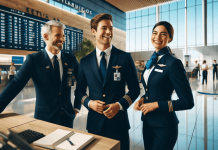The surge in job openings as Flight Attendant presents a unique opportunity for those passionate about travel and customer service. This article will guide you through the application process, highlighting the qualifications and steps involved.
Understanding what airlines look for in candidates can enhance your chances of embarking on this exciting career path. Read on to learn how to apply and soar to new heights in the aviation industry.
The Role of Flight Attendants in Safety and Comfort
Flight attendants are pivotal in ensuring passenger safety and comfort during flights. They are trained to manage emergencies and provide first aid, safeguarding passengers' well-being.
Their presence instills confidence and security among travelers. In addition to safety, they enhance the flight experience with attentive service.
By catering to passengers' needs and maintaining a pleasant cabin environment, they contribute to a memorable journey. The importance of their role cannot be overstated, as they balance safety protocols with customer satisfaction.
Flight Attendant Job Market Overview
The job market is dynamic, influenced by aviation trends and economic factors. Understanding these factors is crucial for aspiring candidates.
- Recovery from the pandemic: As the aviation industry rebounds, there is a growing demand for flight attendants.
- Expansion of routes: Airlines are introducing new routes, creating more job opportunities.
- Focus on customer experience: There is an emphasis on enhancing service quality, requiring skilled attendants.
Airlines Hiring Flight Attendants
Several key airlines are actively seeking flight attendants to join their teams. These airlines offer competitive salaries and benefits, attracting numerous applicants.
They prioritize candidates with solid customer service skills and a passion for travel. As the industry continues to recover, these airlines are playing a significant role in shaping the future of aviation.
Qualifications for Flight Attendants
To become a flight attendant, candidates must meet specific qualifications and requirements. These ensure that they are equipped to handle the demands of the job.
Basic Eligibility Criteria
Candidates must meet specific essential eligibility criteria to embark on a career as a flight attendant. These requirements ensure that applicants are well-suited for the role.
- Minimum age: Most airlines require candidates to be 18 or 21.
- Education: A high school diploma or equivalent is typically required, with some airlines preferring higher education.
- Language proficiency: Fluency in English is essential, and additional languages can be an advantage.
Physical and Medical Standards
To perform their duties effectively, they must adhere to specific physical and medical standards, ensuring the safety and well-being of the crew and passengers.
- Height requirements: There are often minimum and maximum height requirements to ensure safety in the cabin.
- Vision and hearing: Good vision and hearing are crucial for effective communication and safety.
- Overall health: Candidates must pass a medical examination to ensure they fit the role.
Essential Soft Skills
In addition to technical qualifications, flight attendants need essential soft skills. These skills are crucial for providing excellent customer service and working efficiently in a team.
- Communication: Clear and effective communication is vital for interacting with passengers and crew.
- Teamwork: Ability to work collaboratively with colleagues to ensure smooth operations.
- Customer service: Strong customer service skills are necessary to provide a positive experience for passengers.
Applying for Flight Attendant Positions
The application process for flight attendant roles involves several steps. Understanding these steps can increase your chances of success.
Finding and Applying for Positions
To pursue a career, start by searching for openings on airline websites and job platforms. Ensure you meet the eligibility criteria before applying.
Tailor your application to highlight relevant experience and skills. Follow the application instructions carefully to ensure your submission is complete.
Sources for Job Listings
To find flight attendant positions, explore various sources, including airline career pages and specialized job boards. Staying informed about available opportunities is key to a successful job search.
- Airlines' career pages: Many airlines post job openings directly on their websites. (Southwest Airlines, Turkish Airlines, Air France, and United Airlines)
- Aviation job boards: Websites like Aviation Job Search and FlightGlobal list flight attendant positions.
- General job platforms: Platforms like Glassdoor and LinkedIn often feature listings for flight attendant roles.
Crafting a Strong Application
A well-crafted application is essential for standing out in the competitive flight attendant job market. It should highlight your relevant experience, skills, and enthusiasm for the role.
- Resume: Highlight relevant experience, including customer service roles, and mention any language skills.
- Cover Letter: Personalize your cover letter for each application, focusing on your enthusiasm for the role and the airline.
- References: Include professional references who can vouch for your skills and character.
Interview and Assessment Preparation
Research the airline and its values to tailor your responses during the interview. Practice common interview questions and scenarios with a friend or mentor.
Dress professionally and arrive early to make a positive first impression. Practice teamwork and leadership skills to prepare for group assessments.
Training and Certification for Flight Attendants
Once hired, flight attendants undergo rigorous training and must obtain certification. This ensures they are equipped to handle various situations onboard.
Training Process Overview
New flight attendants undergo training that covers safety procedures, emergency equipment, and customer service. Training typically lasts several weeks and includes both classroom instruction and practical exercises.
Successful completion of the training program is required to start working. Ongoing training is common to keep skills up-to-date and comply with regulatory changes.
Certification and regulations:
- FAA Certification: In the United States, flight attendants must be certified by the Federal Aviation Administration (FAA).
- Other Regulations: Depending on the country and airline, additional regulatory requirements may exist.
- Recurrent Training: Flight attendants must undergo recurrent training to maintain their certification and stay updated on safety protocols.
Flight Attendant Salary and Benefits
Flight attendants are compensated with a competitive salary and a range of benefits, contributing to job satisfaction and retention.
- Entry-level flight attendants: Average salary ranges from $30,000 to $40,000 annually.
- Experienced flight attendants: With several years of experience, salaries can reach $50,000 to $70,000.
- Lead flight attendants or purser: Salaries can exceed $80,000 annually.
- International flight attendants Often earn higher salaries due to longer flights and additional language skills.
- Corporate flight attendants: Working for private companies, salaries can vary widely, often exceeding $100,000.
Benefits Overview
In addition to salary, flight attendants enjoy benefits such as travel perks, allowing them to fly for free or at reduced rates. Health insurance and retirement plans contribute to their financial security.
Some airlines also offer bonuses, profit-sharing, and flexible work schedules. These benefits make the career attractive and provide long-term value.
Career Growth in Aviation
Flight attendants have various paths for career advancement within the aviation industry. This growth potential enhances job satisfaction.
Career Advancement Paths
Starting as a flight attendant, individuals can progress to senior or lead positions, overseeing cabin crew operations. Some may transition to training roles, sharing their knowledge with recruits.
Others may move into management, contributing to airline operations and strategy. Specializing in safety or customer service areas can also lead to advanced roles.
Opportunities for Specialization
Continuous training is available for flight attendants specializing in safety, emergency procedures, or customer service. Gaining expertise in these areas can lead to leadership roles within the cabin crew.
Airlines may also offer programs for flight attendants to cross-train in other aviation roles. Specialization can open doors to diverse opportunities within the industry.
Conclusion: Summary of Flight Attendant Job Opportunities
Exploring job openings as Flight Attendant offers a gateway to a rewarding career in aviation. With competitive salaries, comprehensive benefits, and opportunities for advancement, this role is challenging and fulfilling.
Aspiring candidates should prepare diligently for the application process and embrace continuous learning for long-term success. If you're passionate about travel and customer service, a career as a flight attendant could be your ticket to an exciting professional journey.





